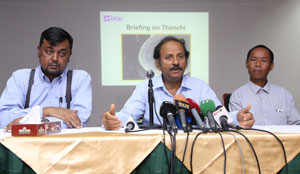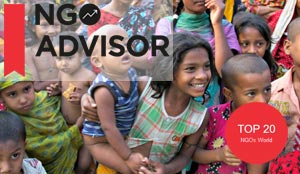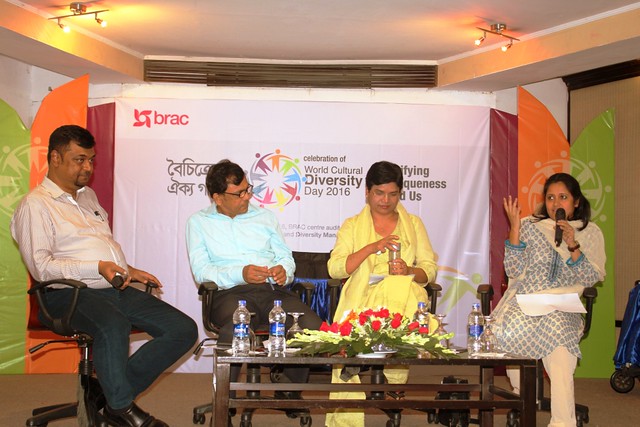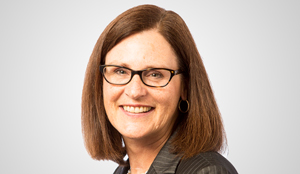
News (826)
Voter ID card urgent to reach out govt aid
BRAC media brief on food shortage in Thanchi
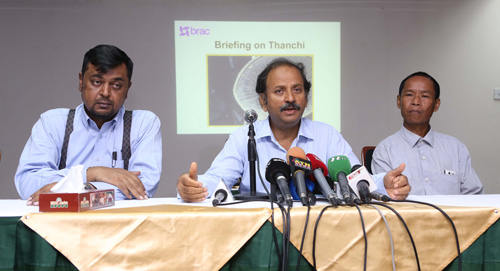
BRAC organised a press briefing today on Thursday on the food shortage in Thanchi upazila. BRAC directors KAM Morshed (left) and Gawher Nayeem Wahra (middle) and Thanchi local inhabitant Piyaching Mro.
Non-governmental organisation BRAC has urged the government to undertake long-term measures to sustainably solve the ongoing food shortage in the remote Thanchi upazila of Bandarban. Among a number of recommendations it has made includes urgent measure to issue voter identity cards to the citizens inhabiting remotest part of the upazila, which will ensure proper distribution of the government food aid.
BRAC organised the media briefing on Thursday at the BRAC Centre at Mohakhali to share its observations from the two field visits its officials made in the current month. More than a dozen staff members including the director of its Disaster Management and Climate Change (DMCC) programme visited the remote upazila.
DMCC director Gawher Nayeem Wahra made the recommendations at the briefing. Among other speakers at the event were Mr KAM Morshed, director, Advocacy for Social Change, Technology and Partnership Strengthening Unit, Piyaching Mro, local community leader in Thanchi, Khamlai Mro, former Thanchi upazila chairman, Apul Tripura and Chinmoy Mro of local civil society organisation Grouch and local volunteer Rajumoy Tanchangya.
The recommendations included cash assistance besides giving rice, fixing date, time and place for rice distribution and informing it to the families affected beforehand, strengthening of malaria diagnosis and treatment for remotest villages, providing alternative means for earning, creating suitable linkages to bring agro-produce to the market, developing transport communication.
BRAC officials said they have identified 1000 households in most need and already handed Tk 2000 cash to 200 families each to enable them to buy medicines and food.
Gawher Nayeem Wahra said, 'According to our estimates, around 20 thousand people of Thanchi upazila are suffering from food shortage. People in Tindu and Remakri unions along with 11 villages in the remotest part of Thanchi Sadar union are suffering the worst. In these areas Mro, Khumi, Tripura, Khyang and Bawm are in worse situation'.
Create development projects for poor, reducing allowance-dependence
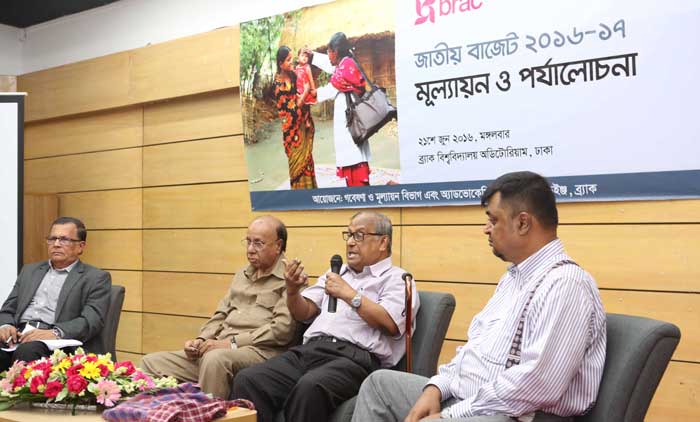
Increasing the amount of allowance and coverage in social safety net programme will not much help reduce poverty. It rather encourages dependence on others and promotes corruption. Only creating income opportunities for the poor communities will help them stand on their own feet, reducing poverty in a sustainable manner, observed speakers today on Tuesday at a seminar on the national budget recently proposed in parliament.
BRAC Research and Evaluation Division and Advocacy for Social Change department jointly organised the event titled ‘A review of national budget 2016-17’ at the BRAC University auditorium at Mohakhali.
Former advisers to caretaker government economists Dr Akbar Ali Khan and Dr Mirza Azizul Islam were key speakers, while Research and Evaluation Division director Professor Abdul Bayes gave the key presentation. Advocacy for Social Change director KAM Morshed moderated.
In welcome speech KAM Morshed said, since 1972 BRAC has been working to reduce poverty. In continuation of its work the seminar was organised to review how this budget will influence the economic development and social empowerment of the poor communities.
The keynote presentation gave a brief review of different aspects of the proposed budget, including its size and volume, deficits, tax structure and its various limitations in the light of Vision 2021 and Sustainable Development Goals. The keynote also gave eight recommendations, including strengthening of GO-NGO partnership in budget implementation, creation of taskforce to guide and monitor ADP implementation, increased allocation for social and health sectors, adoption of agriculture-friendly policies and increased agricultural investment.
Highlighting the successful cooperation between BRAC and Bangladesh government in different sectors, Professor Bayes said the organisation has proved to be a tested partner of the government since the 1970s. Oral rehydration programme in the 1970s, child vaccination in 1980s and TB control programme, loan programme for tenant farmers, programme to reduce ultra poverty in the post-1990 period are some of the programmes implemented successfully where the government partnered with BRAC.
He further observed that the government should bring NGOs into further partnerships to ensure successful implementation and evaluation of the programmes in development sector under 2016-17 budget. It will help reduce red-tapism and increase cost effectiveness.
Dr Akbar Ali Khan said, ‘It is not sufficient to allocate money only, there has to be projects. Then effectiveness must be ensured and corruption checked through strict monitoring. If we finish the education budget paying the recruitment of more teachers and their salary, where the money should come from for improving the quality of education? It is not enough for a budget to become ambitious only, it has to be implementable also’.
Dr Mirza Azizul Islam said, ‘The minister in his budget speech mentioned the goal to establish an equity-based society. But the major part of our budget comes from taxes. In this budget [proposed 2016-17 budget] indirect taxes occupy 61 per cent, which will increase pressure on the low-income groups. According to the World Bank, except childcare the public expenditure in health sector benefits more the well-off than than the poor’.
The speakers also answered to the questions of the media and other guests at the seminar.
BRAC ranked number one NGO in the world
NGO ADVISOR announced its 2016 Top 500 NGOs World rankings, and BRAC returned to the top spot
Geneva, Switzerland: BRAC, an international development organisation dedicated to spreading solutions to poverty worldwide, today was ranked the number one NGO in the world by the Geneva-based NGO Advisor, an independent media organisation committed to highlighting innovation, impact and governance in the non-profit sector. BRAC clinched the top spot as part of the 2016 Top 500 NGOs World rankings.
"This recognition is truly an honour," said Sir Fazle Hasan Abed, founder of BRAC. "BRAC staff work tirelessly to both innovate and apply proven solutions at scale to empower people worldwide living in poverty. It is wonderful to see this dedication recognised."
Each year, NGO Advisor researches, evaluates and ranks NGOs from around the world, highlighting the best in their annual Top 500 NGOs World list. NGO Advisor announced the new rankings on its website Friday, June 17.
Of more than 500 organisations worldwide, NGO Advisor placed BRAC first in its international category, based on its impact, innovation and sustainability. BRAC was praised for its holistic approach to fighting poverty, treating it as a system of interrelated barriers that must be addressed concurrently. The ranking also highlighted the organisation’s history of designing and implementing solutions at scale.
“From the perspective of our ranking criteria – impact, innovation and sustainability – BRAC ticks every box. Over the course of its decades-long history, BRAC has assumed an unparalleled position in the crowded field of international development, all while remaining committed to a holistic, evidence-based approach to poverty reduction,” said Jean-Christophe Nothias of NGO Advisor in a statement.
BRAC, formerly Bangladesh Rural Advancement Committee, was founded in Bangladesh in 1972, and today is a global leader in creating opportunities at scale as a means to end poverty. It is the world's largest non-governmental development organisation, touching the lives of an estimated 138 million people in 12 countries using a wide array of tools such as microfinance, education, healthcare, legal rights training and more to create opportunities for people most in need.
“As we noted last year, BRAC is in many ways a microcosm of the entire international development sector…gaining in independence from donor influence each year. It covers almost 80 per cent of its USD 684 million income through a burgeoning portfolio of catalytic social enterprises – a clear trend positioning the organisation in an enviable position of financial and programmatic sustainability,” said NGO Advisor on its website.
NGO Advisor combines academic rigour with journalistic integrity and autonomy, evaluating each organisation based upon its objective merits. Co-founded by Jean-Christophe Nothias, a journalist formerly with The Global Journal, the rankings methodology was first developed in 2009.
Nothias has since enlisted experts at The University of Geneva and partners from the non-profit sector to improve the evaluation metrics. Today, NGO Advisor presents its findings to an international audience of donors, volunteers, journalists, researchers, diplomats and non-profit leaders to showcase best practices and mirror the evolving values of the global community.
The new rankings include several notable organisations. The Skoll Foundation, a social entrepreneurship foundation based in Palo Alto, California, claimed the third spot, and Médecins Sans Frontières, also known as Doctors Without Borders, the number two. The Danish Refugee Council and Oxfam rounded out the rankings in the fourth and fifth spot, respectively. Last year, BRAC was ranked number two, after initially taking the first place spot two years ago.
BRAC and BRAC International Celebrates World Day for Cultural Diversity 2016
Unifying Uniqueness and Us
BRAC and BRAC International operating countries celebrated the Inclusion and Diversity Management Campaign (IDMC) day. This celebration is celebrated for the second time across BRAC’s head office and BRAC International countries on 21 May on world cultural diversity day under the theme “Unifying Uniqueness and Us”.
Likewise the last year, diversity day was celebrated in all BI countries, which had cultural and cooking events, games and dances. Additionally, this year’s programme took place over the course of a day and began in BRAC’s office premises with a display board erected for writing comments and hand printing to showcase what diversity means to BRAC. The main event began after lunch and was comprised of welcome speeches, presentations and panel discussions all relating to the importance of diversity to foster and instill its importance. The colorful cultural programme also featured performances from people of differing national, ethnic and physical abilities.
The main objective of the initiative was to enhance knowledge and sensitivity on diversity and inclusiveness and to increase empathy of other cultures through opportunities to interact with different cultures at the international level. The vision of IDMC is: to promote Intercultural sensitivity, embracing differences, easily adaptable mindsets and diverse perspectives, richer teams
Through a series of activities, this campaign aims to touch all the employees, all-level of staff and ultimately the programme participants (beneficiaries) along with the community.We hope to continue making great strides toward promoting diversity and inclusion in the workplace to ultimately help achieve the vision of BRAC.
Family Planning, Mother-Child Health and Adolescent Health Service and Campaign Week 2016: with successful participation of BRAC

Family planning, mother-child health and adolescent health service and campaign week 2016 was recently held across the country from 14-19 May. BRAC also observed this national event focusing on family planning counselling. BRAC worked intensively to promote family planning to create awareness among people concerning overpopulation, mother-child healthcare and adolescent health besides providing healthcare services to mothers, children and adolescents. Special daylong camps were organised at five maternity centres in Dhanmondi, Mirpur, Gulshan, Jatrabari and Uttara region of Manoshi project. Various family planning materials were distributed for free in those centres and people were advised on different methods of family planning. Md Delwar Hossain, director, directorate general of family planning, Dhaka division, Dr Md Abdul Haque AD, Dhaka and regional supervisor, FPCST-QAT, Mirza Kamrunnahar, DDFP, Dhaka district, Md Mizanur Rahman TFPO, family planning office Mirpur, Dhaka and other government officials visited the camps during the event.
National Safe Motherhood Day 2016
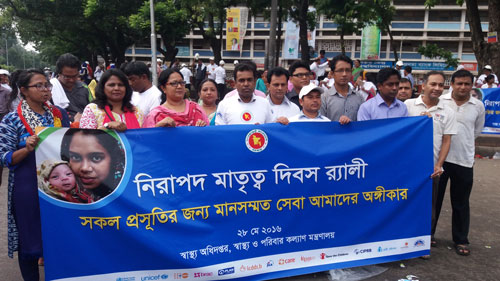
National Safe Motherhood Day 2016 was celebrated on May 28 across the country to create awareness on maternity care for pregnant and lactating women.
The health, nutrition and population programme (HNPP) of BRAC participated in the event along with the government through various activities. BRAC participated actively in all the government events at district and community level.
Let's have a look on BRAC's activities that were carried out on National Safe Motherhood Day 2016:
Activities done by essential health care (EHC) and maternal neonatal and child health programme (MNCH)
- Community health workers of essential health care (EHC) and maternal neonatal and child health (MNCH) programme mobilised the pregnant women to deliver anti natal care (ANC) and post natal care (PNC) from community clinic.
- Paramedics of MNCH rural programme provided free ANC/PNC to the women in char area.
- Manoshi midwives provided ANC/PNC to the women in slum areas in BRAC delivery centres.
- Field staff of HNPP attended a rally organised by the Ministry of Health of Bangladesh.
Activities done by Marketing Innovation for Health (MIH)
- Staff of MIH and other programmes of HNPP participated in the rally in seven districts and 51 sub-districts organised by government.
- Community health workers highlighted a range of topics like anti natal care, birth planning, usefulness of delivery kit among others during health education forum
- Community health workers of MIH programme mobilised mothers to deliver comprehensive ANC through government service centres.
BRAC responds to Cyclone Roanu in Bangladesh
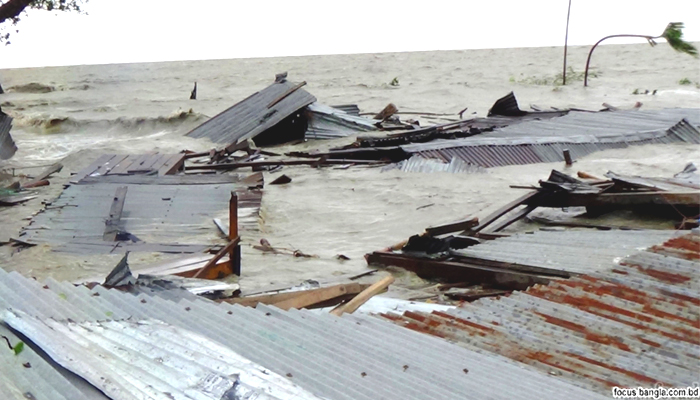
Photo credit: Kiron/Focus Bangla News
On May 21, 2016, a cyclone devastated the low-lying coastal regions of Bangladesh. BRAC is playing a leading role in providing relief, particularly in hard to reach areas, through its extensive reach in the south.
Cyclone Roanu hit the coast of Bangladesh at 11:00am on 21 May 2016. Winds reached speeds of 102 kilometres per hour and caused massive damage to houses, businesses and agricultural lands. Heavy rainfall inundated the southern coastal regions of the country and caused severe landslides. An estimated 50,000 houses were partially damaged and more than 24,000 properties were destroyed.
Roanu was half the strength of 2007’s Cyclone Sidr, which killed 3,447 people and caused millions of dollars in damage. A coordinated community response led by authorities and supported by BRAC and other agencies helped 500,000 people relocate to cyclone shelters the day before the cyclone hit. To date, 24 deaths have been recorded.
The cyclone forced the cancellation of the national Higher Secondary Certificate examinations. BRAC is providing water, food supplies and cash transfers to families who have been affected by the cyclone, as well as distributing special cash grants to exam candidates. A total of BDT 2 million has been allocated for relief efforts, focusing on specific areas that have not received immediate supplies.
The organisation’s priorities are to support the continuation of education and establish child-friendly spaces to ensure that children are busy with activities while out of school.
“Disaster responses traditionally focus on the immediate needs of survivors,” said Dr Muhammad Musa, executive director of BRAC. “Children and young people are often forgotten and become the most vulnerable group. We are focusing on meeting basic needs, while also ensuring that children are kept safe and can continue learning.”
In addition to providing relief, BRAC is participating in the government-initiated joint needs assessment for loss and damage. This is the first time that a Bangladesh-based non-governmental organisation has participated in this assessment.
BRAC is leading the first phase of the assessment in Patuakhali and co-leading the assessment in Cox’s Bazar, which were two of the most affected districts. Cyclone Roanu affected multiple districts including Chittagong, Cox’s Bazar, Chandpur, Naokhali, Feni, Laxmipur, Bagerhaat, Khulna, Barisal, Potuakhali, Pirojpur, Bhola, Borguna and Jalokathi – all areas where BRAC has programmes.
BRAC Manthan Digital Innovation Award 2016
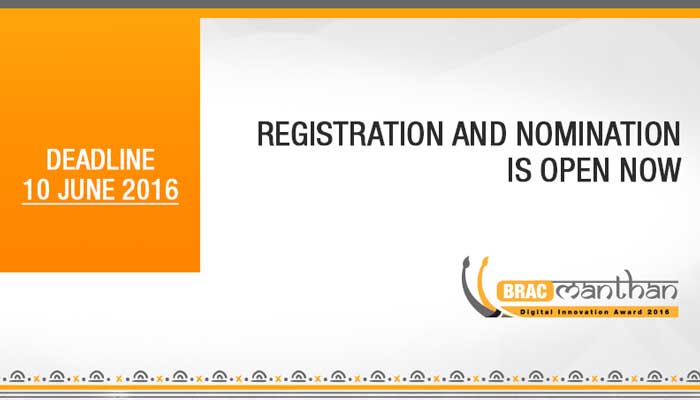
In the last decade, innovators, entrepreneurs and change makers in Bangladesh have developed outstanding innovations using ICT and digital tools. Ideas like bKash, Chaldal, JAAGO Online School and more recently, Maya Apa prove how technology, when used the right way, can create the most meaningful impact. However, many of these wonderful initiatives are hardly known outside of Bangladesh. Now this is about to change.
A joint collaboration between BRAC and Digital Empowerment Foundation (DEF) based in India, has launched the Bangladeshi chapter of Manthan Award, the most prestigious award in the field of ICT and digital innovation in the Asia Pacific, as ‘BRAC Manthan Digital Innovation Award’, with a vision to recognise our local talent in an international platform. The winners of BRAC Manthan Digital Innovation Award will find a direct entry to Manthan Award, Asia, allowing them the space to perform against international competitors.
The BRAC Manthan Digital Innovation Award will accept registrations under nine categories. The categories are: e-business and financial inclusion, e-education, learning and employment, e-agriculture and ecology, e-governance and institutions, e-health, e-women, inclusion and empowerment, e-news, journalism and entertainment, e-culture, heritage and tourism, and m-content.The registration will close on 10 June 2016. Those using ICT and other digital tools in their businesses, projects or social work with visible impact are eligible to register here: http://brac.manthanaward.org/.
BRAC USA welcomes new President and CEO
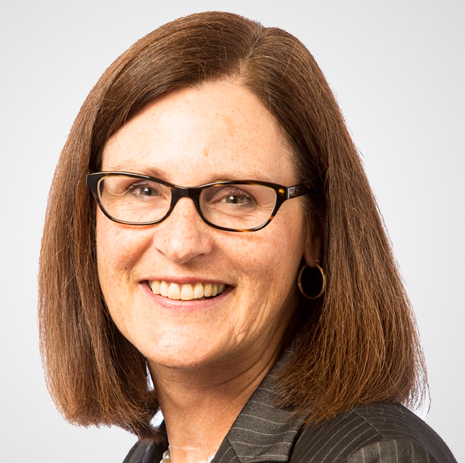
BRAC USA, the U.S. affiliate of BRAC, a global leader in creating opportunity for the world’s poor and the world’s largest nongovernmental development organisation, today announced the appointment of Donella Rapier as its new President & CEO. Donella will succeed BRAC USA founding President, Susan Davis, who completed ten years of outstanding service in December 2015.
BRAC is a development success story, spreading anti-poverty solutions born in Bangladesh to 11 other developing countries in Asia, Africa and the Caribbean. Donella will bring over 30 years of extensive finance, fundraising and non-profit management experience to its U.S. operations.
For the past four and a half years, Donella served as the Chief Development and Administrative Officer at Accion, a pioneer and global leader in microfinance and financial inclusion whose work spans nearly two dozen countries. Prior to that, she was the Chief Financial Officer at Partners In Health, a global healthcare organisation working in remote places where healthcare alternatives are limited or otherwise nonexistent, such as Haiti, Rwanda and Malawi. Earlier in her career, Donella spent more than a decade in senior leadership roles at Harvard University, including Vice President for Alumni Affairs and Development and Chief Financial Officer for Harvard Business School. Donella received her MBA from Harvard Business School and began her career at Price Waterhouse.
“BRAC USA is enormously fortunate to have someone with Donella’s range of skills and depth of experience as the new leader for our organisation,” said Lincoln Chen, Chair of the Board for BRAC USA. “She is a skilled builder of organisations and is deeply committed to empowering people and communities in situations of poverty.” Sir Fazle Hasan Abed, the Founder & Chairperson of BRAC Bangladesh, applauded the appointment: “Donella is a great addition to the BRAC family, bringing talent, expertise, and commitment to our work of ending poverty.”
“I am truly honored to be joining the remarkable BRAC family of organisations,” said Donella Rapier. “BRAC has made an enormous difference in the world and, by many measures, is one of the most successful organisations driving social change. I am eager to dive in and build on the excellent foundation laid by a decade of pioneering work to further BRAC’s reach and potential for even greater impact.”
Donella will join BRAC USA full time in July 2016.
World leaders send their best wishes to Sir Fazle on his 80th birthday
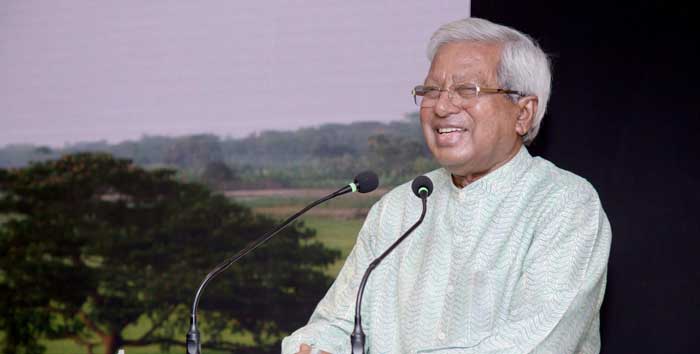
3 May 2016, Dhaka
In celebration of BRAC’s founder and chairperson Sir Fazle Hasan Abed’s 80th birthday, messages have been flooding in from all across the world to wish him a happy birthday. Global leaders such as Gordon Brown, the former prime minister of the UK, Desmond Swayne, Minister of State for International Development (DFID), UK, Concetta Fierravanti-Wells, Minister of International Development and the Pacific, Australia, and Ellen Johnson Sirleaf, the President of Liberia, are among the few that have been extending their best wishes.
In a message, Bill Clinton, former president of the United States, says, ‘You’ve helped millions of people in Bangladesh and beyond to escape poverty through the dignity of their own work. In doing so, you’ve revolutionised the way we all think about development. Luckily for all of us, you show no signs of slowing down anytime soon.”
Bill Gates, co-chair and trustee of the Bill & Melinda Gates Foundation, said, ‘We’ve had a great partnership with BRAC for more than a decade, and it’s made a huge difference. Through BRAC, you have changed the course of history for millions globally. For your vision and commitment to creating a better world, we salute you.”
“Abed bhai, happy birthday,” said Jim Kim, President of the World Bank. Having met Sir Fazle more than a decade ago, he says, ‘The scale and impact of what he’s done, and yet the utter humility with which he’s done everything, I think is a lesson for every single one of us who are working in development. For Abed bhai, everything has always been about making sure that women are empowered; making sure that children have education, even through informal systems.’
Join the world’s biggest family

